Septoplasty in Cancun
Search and Compare the Best Clinics and Doctors at the Lowest Prices for Septoplasty in Cancun

Find the best clinics for Septoplasty in Cancun
With Medijump you can browse 2 facilities offering Septoplasty procedures in Cancun. The cheapest price available is $1,417 in Guadalajara
Septoplasty in Mexico
Price: $ 1,417
Septoplasty in Guadalajara
Price: $ 1,417
Septoplasty in Los Algodones
Price: $ 1,489
Romania offers the best prices Worldwide
Price: $ 404
From 8 verified reviews
Henry Beltran, 25 January 2020
Extremely clean, quiet and very spacious rooms, excellent service
Dr. Jorge Uribe Kalafatic, located in Blvd Kukulcan, Cancun, Mexico offers patients Septoplasty procedures among its total of 43 available procedures, across 6 different specialties. Currently, there's no pricing information for Septoplasty procedures at Dr. Jorge Uribe Kalafatic, as all prices are available on request only, whilst the national average price is approximately $2,543. All procedures and treatments are undertaken by the lead specialist at the Hospital, and they are accredited by AMCPER - Asociación Mexicana de Cirugía Plástica, Estética y Reconstructiva
Compare Before & After Photos of _procedure_photos.phpSeptoplasty
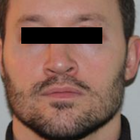
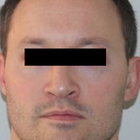
Front view
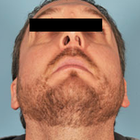
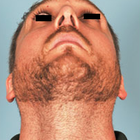
Front view
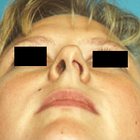
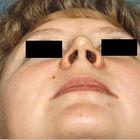
Front view
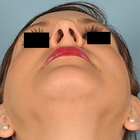
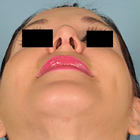
Front view
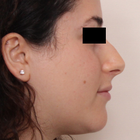
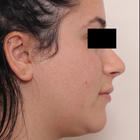
Full-side view
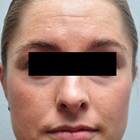
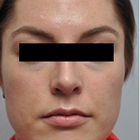
Front view
WHY US?
At Medijump, we're making medical easy. You can search, compare, discuss, and book your medical all in one place. We open the door to the best medical providers worldwide, saving you time and energy along the way, and it's all for FREE, no hidden fees, and no price markups guaranteed. So what are you waiting for?

Free

Best Price

Widest Selection

Risk-Free
What you need to know about Septoplasty in Cancun
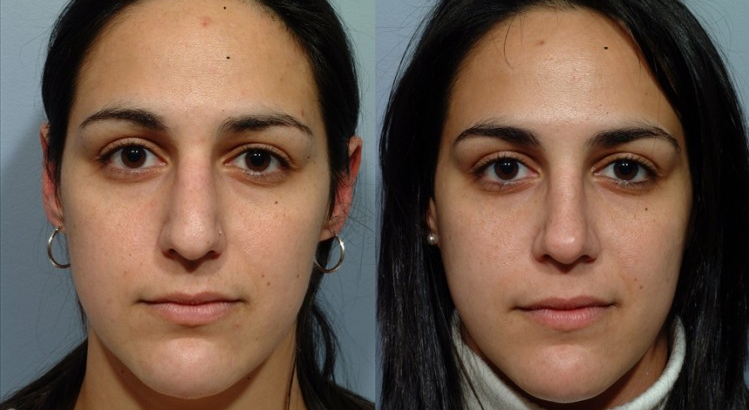
A septum is a bone and cartilage that separates the nasal cavity of the nose. When your nasal septum is off-center, crooked, or moved to one side of your nose, it is a condition known as a deviated septum and can make breathing difficult. To correct this condition, you may need to undergo Septoplasty, where your septum will be straightened to allow better airflow through your nose. This surgery is the only way to fix a deviated septum. However, septoplasty may also be performed to treat long-term sinusitis, remove nasal polyps, or treat other conditions that block the nasal airways. Sometimes, surgeons also recommend this surgery to stop recurrent nosebleeds and facial pains. For conditions other than deviated septum, surgeons often only recommend septoplasty after ruling out other treatments.
What does a Septoplasty Procedure Involve?
A deviated septum is common, but when the condition is severe, it can block one side of your nose and reduce airflow. It can also contribute to crusting or bleeding. If you experience difficulty breathing through your nose that significantly affects your life, you may want to consider septoplasty. Before the surgery, your doctor will review the details of the surgery and ask you to complete some routine tests, such as a blood test, electrical heart tracing, or X-ray. Be sure to tell your doctor if you have any possible allergies. To prepare for the procedure, you may need to stop taking certain medications at least two weeks before the surgery because they can increase your risk of excessive bleeding and the medications include aspirin, ibuprofen, and other blood-thinners.
Septoplasty can be carried out under local anesthesia or general anesthesia. If you have the surgery under local anesthesia, you should not eat or drink anything after midnight the night before the procedure. Not eating and drinking will prevent you from vomiting and choking if the anesthesia nauseates you during surgery. Your surgeon will start the surgery by making an incision on one side of your nose to access the septum. They will then lift the mucosa lining that covers the cartilage and bone. Next, they will reshape the cartilage and bone to move the deviated septum to the correct position. Extra pieces of bone or cartilage that make barriers will be removed. Then, they will reposition the mucous membrane. You may need stitches to hold the septum and membrane in place. Soft silicone splints are sometimes inserted inside the nostrils to support the septum. The whole procedure takes between 30 to 90 minutes to complete.
How Long Should I Stay in Cancun for a Septoplasty Procedure?
Septoplasty is an outpatient procedure, which means you will likely go home on the same day of the surgery after the anesthesia has worn off unless major complications arise. However, you should stay in the Cancun for 3-4 days for the initial recovery and follow-up checkups. If your surgeon places splints in the nose, they will be removed within seven days. You may return home when your surgeon allows you as long as there is no complication.
What's the Recovery Time for Septoplasty Procedures in Cancun?
You may feel drowsy for a few hours following the surgery and you may also feel pain. However, your surgeon will prescribe medication to help with the pain. Some congestion and bleeding can occur after you are discharged from the hospital as your body recovers, but these symptoms should be gone in 2 weeks. The recovery period varies from one person to another. In general, you should be able to return to work within a few days, but you should allow at least three weeks before going back to your full normal routine. You should also limit your physical activities such as exercise for several weeks to minimize swelling and speed up healing because intense physical activities can increase your blood pressure and lead to bleeding.
What sort of Aftercare is Required for Septoplasty Procedures in Cancun?
Your doctor will give you post-operative care instructions, which you will need to follow, The wound on your nose will heal fairly quickly, and your breathing will improve shortly after the procedure. For a quicker recovery, you may need to elevate your head at night to keep the swelling down, wear a button-up shirt so you do not need to pull clothing over your head, and do not blow your nose for at least two to three days after surgery. Avoid drinking alcohol, smoking tobacco, returning to work too soon, strenuous activities, and being in a crowd where people are smoking or coughing.
What's the Success Rate of Septoplasty Procedures in Cancun?
The success rate for septoplasty is high, with up to 85% of people experiencing a significant improvement in their nasal blockage after surgery.
However, some people will require a second surgery if they are not satisfied with the results. Septoplasty is a very low-risk procedure, but you should be aware of the possible complications and side effects and these risks can include:
- Bleeding in small amounts is common, but in rare cases, excessive bleeding may occur.
- Infection can occur after septoplasty because the nose is not a sterile environment.
- Toxic shock syndrome is a very rare and life-threatening infection.
- Septal perforation is a small hole that can sometimes develop in the nasal septum during or after the surgery.
- Spinal fluid leak and it is extremely rare.
Other risks such as scarring, and altered nose shape, discoloration of the nose, a decreased sense of smell, tooth or nose numbness, and continuing symptoms are also possible. Other than following your surgeon’s aftercare instructions, keeping the nose clean and washing your hands often can reduce the risks.
Are there Alternatives to Septoplasty Procedures in Cancun?
Although most conditions of a deviated septum can only be treated by septoplasty, there are nonsurgical treatments for other nasal blockages to help you breathe better. If your nasal blockage is caused by an allergy, you may take antihistamines from your doctor or over-the-counter. In cases of bacterial infection, your doctor can prescribe antibiotics to help clear the nasal airways.
Whilst the information presented here has been accurately sourced and verified by a medical professional for its accuracy, it is still advised to consult with your doctor before pursuing a medical treatment at one of the listed medical providers
No Time?
Tell us what you're looking for and we'll reachout to the top clinics all at once
Enquire Now

Popular Procedures in Cancun
Prices Start From $1,945

Prices Start From $101

Prices Start From $192

Prices Start From $500

Recommended Medical Centers in Cancun for Septoplasty

- Interpreter services
- Translation service
- Religious facilities
- Medical records transfer
- Medical travel insurance
- Health insurance coordination
- TV in the room
- Safe in the room
- Phone in the room
- Private rooms for patients available

- Interpreter services
- Translation service
- Religious facilities
- Medical records transfer
- Medical travel insurance
- Health insurance coordination
- TV in the room
- Safe in the room
- Phone in the room
- Private rooms for patients available

- Interpreter services
- Translation service
- Religious facilities
- Medical records transfer
- Medical travel insurance
- Health insurance coordination
- TV in the room
- Safe in the room
- Phone in the room
- Private rooms for patients available

- Interpreter services
- Translation service
- Religious facilities
- Medical records transfer
- Medical travel insurance
- Health insurance coordination
- TV in the room
- Safe in the room
- Phone in the room
- Private rooms for patients available

- Interpreter services
- Translation service
- Religious facilities
- Medical records transfer
- Medical travel insurance
- Health insurance coordination
- TV in the room
- Safe in the room
- Phone in the room
- Private rooms for patients available
Septoplasty in and around Cancun
About Cancun
Occupying a coveted location on Mexico's Yucatan peninsula and bordered by the Caribbean Sea, Cancun stands as the country's top-tier coastal attraction. This city, best recognized for its sprawling 21 km stretch of pristine white sandy beaches, also presents exhilarating water-based recreational activities and a lively nocturnal scene.
Cancun is emerging as one of the most desirable destinations for medical tourism. It has world-class healthcare facilities and internationally accredited hospitals. The city hosts two of the five JCI accredited hospitals in Mexico. Furthermore, Multi-million dollar ‘Health City' project is underway and the aim of the project is to establish the largest medical complex of its kind in the country.
Annually, Cancun welcomes thousands of individuals from various global corners seeking to undergo an array of medical procedures. Affordability remains a key attraction, with patients managing to save approximately 60-80% in total healthcare costs, inclusive of travel and accommodation. As an illustration, a bariatric surgery that could set you back by $25,000 in the US could be feasibly done in Cancun for a mere $600.
The gamut of medical procedures offered in this beach-front city spans across dental treatments, alternative therapies, aesthetic surgery, cardiac surgery, cosmetic surgeries, as well as obstetrics and gynecology. The most sought-after treatments are typically dental and cosmetic surgeries, largely undertaken at acclaimed centers such as Perfection Makeover and Laser Center, Cancun Dental Specialists, and Hospital Galenia.
Popular parts in Cancun
Cancun, a prominent resort city, can be broadly classified into two distinctly different areas: the Zona Hotelera Cancun and Cancun Downtown.
-
Zona Hotelera Cancun
The area encompasses several suburbs. The zone lies on the 15-mile long sandbar just off the mainland. Beachfront luxury resorts, shopping malls, multi-cuisine restaurants, and lovely Caribbean beaches are the highlights of the area. The nightlife is exhilarating with glitzy bars and salsa clubs. You can enjoy the rotating observation deck on the scenic tower Cancun to enjoy the breath-taking view of the ocean and the city.
Tourists can indulge in a number of water sport activities including snorkeling, windsurfing, paragliding, scuba diving, and water skiing. The natural water park Xel-Ha is ideal for snorkeling.
Your trip will be incomplete without a visit to the age-old Mayan Museum. Cancun is the starting point for discovering Maya Riveria, which houses the world's second largest coral reef.
The picturesque island, Isle Mujeres is just a few miles off the coastal line and has pristine beaches. The world-famous underwater Museum, MUSA is an absolute visual treat for the tourists. The museum has over 500 stunning sculptures. You can admire their beauty from inside the glass bottom boats.
-
Cancun downtown
The downtown portion of Cancun is characterized as a bustling hive of lively shops, diverse eateries, and spirited pubs. Tulum Avenue stands out as the primary and most attractive boulevard in the area, boasting an impressive assortment of handicraft shops, theatre venues, departmental stores, and shopping centers.
The city’s expansive open-air market, Mercado 28, enjoys popularity for its vendors specializing in silver jewelry and unique souvenirs. Yaxchilan Avenue, a street forever brimming with animated bars and restaurants, virtually never sleeps.
The residential architecture within Cancun downtown predominantly comprises of apartment complexes and villas.
Weather and Climate in Cancun
Endowed with the quintessential sun-soaked holiday weather, Cancun boasts a tropical savanna climate characterized by two distinct cycles: the dry season and the rainy season. Average temperatures generally oscillate between 23°C and 28°C. Dips below 21°C are fairly rare, just as surges above 34°C.
The optimal time to plan a visit to this city spans from November to April. This timeframe offers moderate temperatures and minimal rainfall, making it an appealing period for a holiday. However, it's noteworthy that accommodation costs tend to hike significantly during these months.
- Wet season: May to October and the city receives 984 mm rainfall during this season. Yet, during the day, you can enjoy plenty of sunshine. Short episodes of thunderstorms are more common and due to the less favorable climatic conditions, the inflow of tourists reduces during this season.
- Dry season: November to April. The temperature is warm and it is the perfect time to swim. Occasional showers are common with a few cool and windy days.
Getting around in Cancun
It is easy to get around and navigate in Cancun, as most of the tourist attractions lie in the Zona Hotelera. Taxis, public buses and other means of transportation are available to cater to the needs of the locals and the tourists.
- Bus: Is the easiest and the cheapest way to get around. The one-way ticket can cost you somewhere between 0.50 cents to $1. The existing bus routes connect Zona Hotelera and Cancun downtown. You can visit all the locations on your bucket list by bus. Regional buses are available to travel from Cancun to other tourist towns.
- Taxis: They are not metered, so it is good to agree on the fare before departing. You can expect to pay $40-$50 if you are taking a taxi from the airport to downtown. Normally, inside the city, you need to pay somewhere between $10 and $25 per journey.
- Ferry: Ferry services are available to travel to nearby islands like the Isle of Mujeres. Ferries run at a frequency of 30 minutes and will cost around $19 for adults and $14 for kids for a return ticket.
- Flight: The second busiest airport of Mexico, Cancun International Airport is a 25-minute drive from the Zona Hotelera. Several domestic flights and International flights heading to the US, UK, and Europe operates from here.
Tourist Visa in Cancun
Visa requirements for Mexico:
Citizens of 67 countries, including Australia, Brazil, Belgium, Canada, the USA, UK, Spain, Japan, and more, are exempt from visas when visiting Mexico for up to 180 days.
Citizens of India, China, and Russia need to apply for a tourist visa in advance before traveling to Mexico. The tourist visa is valid for six months from the date of entry and can be extended for up to six months. The tourist visa fee is around $22 USD.
How to apply for a Mexican tourist visa:
You can apply for a Mexican tourist visa online or at a Mexican embassy or consulate. The online application process is relatively straightforward and takes about 20 minutes to complete. You will need to provide your passport information, travel dates, and contact information. You will also need to upload a digital photo of yourself.
Once you have submitted your application, you will receive an email confirmation. You should then receive your visa within 5 to 10 business days.
Additional Information
- Mexico is ethnically diverse. Spanish is the main language widely spoken here. However, you will notice locals conversing in Mayan with each other. There are 68 indigenous languages in Mexico. Most People in Cancun will speak English.
- The Mexican peso (MXN) is the official currency of Mexico. As of October 11, 2023, 1 USD is equivalent to approximately 19.6 Mexican pesos. The exchange rate fluctuates daily, so it is best to check the latest rate before traveling.
- ATM machines lie inside the premises of the bank. Money exchange booths are there to convert currencies. Traders accept both credit and debit cards.
- Almost 89% of the population in Cancun are Catholics.
- Public holidays in Cancun:
- New Year's Eve - January 1
- Christmas Day – December 25
- Revolution Day – Third Monday in November
- Independence Day – September 16
- Good Friday
- Constitution Day – First Monday of February
Popular Searches
- Plastic Surgery in Thailand
- Dental Implants in Thailand
- Hair Transplant in Thailand
- Breast Augmentation Thailand
- Gastric Sleeve in Thailand
- Gender Reassignment Surgery in Thailand
- Laser Hair Removal in Bangkok
- Botox in Bangkok
- Dermatology in Bangkok
- Breast Augmentation in Bangkok
- Coolsculpting in Bangkok
- Veneers in Turkey
- Hair Transplant in Turkey
- Rhinoplasty in Turkey
- Stem Cell Therapy in Mexico
- Rhinoplasty in Mexico
- Liposuction in Mexico
- Coolsculpting in Tijuana
- Rhinoplasty in Korea
- Scar Removal in Korea
- Gastric Sleeve in Turkey
- Bone Marrow Transplant in India
- Invisalign in Malaysia
- Plastic Surgery in the Dominican Republic
- Tummy Tuck in the Dominican Republic
- Plastic and Cosmetic Surgery in Poland
- Rhinoplasty in Poland
- Hair Implant in Poland
- Dental Implants in Poland
- IVF in Turkey

